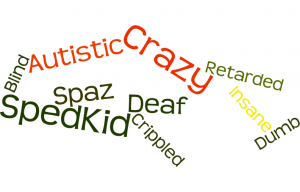Your words end up being used as labels. Be careful how you mean what you say.
Words
What people mean with their words may be much different than how they are interpreted. An article written by The Eyeopener about Ryerson’s “dropouts” is a great example. When a student makes a decision to change direction, take a different career path, they may need to “drop out” of a class or possibly even need to drop out of an institution because there is a more appropriate program elsewhere. This can result in a label of “dropout” being applied to the student. When you hear that reference, does that create a biased impression of the person?
Another example is a personal experience. I was having a discussion about someone with autism. I referred to a person as autistic. Luckily, the person I was speaking with was very attuned to the words and corrected me. There is no such thing as an autistic person. Rather, there are people with autism. We were discussing the effects of the condition on the person, not labeling the person.
Recently, I was talking to a friend about someone recently diagnosed with a mental health issue and referred to them having been put in a “rubber room”. Worse, it was a text chat and no way for them to interpret my body language and understand that I was actually hurting because the person in the mental health facility is very close to me. My friend was quick to respond “Rubber room…Only the really well adjusted can afford to use terminology like that. And you all wonder why we, the injured, don’t ask for help.” So insensitive of me, especially when the person I was chatting with was a close friend and I knew they had experienced Post Traumatic Stress Disorder (PTSD).
Mean what you say and remember words matter.
Meaning
I believe that most people have no malice or mean intent with their words. We occasionally slip back to a time in our lives when words had much different connotations than today. Keep in mind that your meaning may not be received the way you intended. We all have different life experiences and apply filters through which we see and hear.
 Take the word retarded in the context of a person’s mental development. When someone called you “a retard”, it was meant to be an insult. Eventually, that became the standard interpretation. Over time, “retarded” became developmentally delayed and today, we recognize everyone’s personal learning styles are different and we respect that everyone has different skills to offer.
Take the word retarded in the context of a person’s mental development. When someone called you “a retard”, it was meant to be an insult. Eventually, that became the standard interpretation. Over time, “retarded” became developmentally delayed and today, we recognize everyone’s personal learning styles are different and we respect that everyone has different skills to offer.
Today, we would say people with intellectual and other developmental disabilities. Although personally, I don’t like to say disability. What may appear disabled can lead to strengths in other areas beyond what “normal” people are capable of. Maybe a term like “people with exceptional abilities” would be a better moniker.
Labels
 Words like “Retard, Schizo, Autistic,” quickly become labels applied to individuals. Next time you find yourself labeling a person with a symptom or condition, think about how you would feel if someone identified you by something other than your name.
Words like “Retard, Schizo, Autistic,” quickly become labels applied to individuals. Next time you find yourself labeling a person with a symptom or condition, think about how you would feel if someone identified you by something other than your name.
For example, Refugees. People are coming to Canada to seek refuge and find safe haven. The want to be able to dream of a future where their families can live without the fear of armies who are trying to eliminate a whole demographic. Sure, New Canadians bring some challenges with them. Just like our grand parents and great grand parents who came from places like Europe, Korea and other countries over the years and are now part of the Canadian fabric. These people who “threatened our jobs” in fact created opportunities for ALL Canadians.
What’s that old saying? “Don’t judge lest ye be judged“. Think twice before you start applying labels to others.
Please share ...